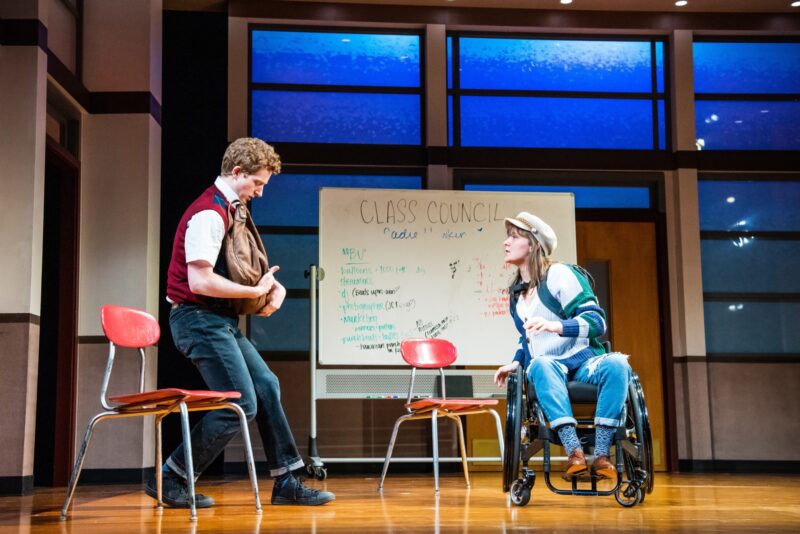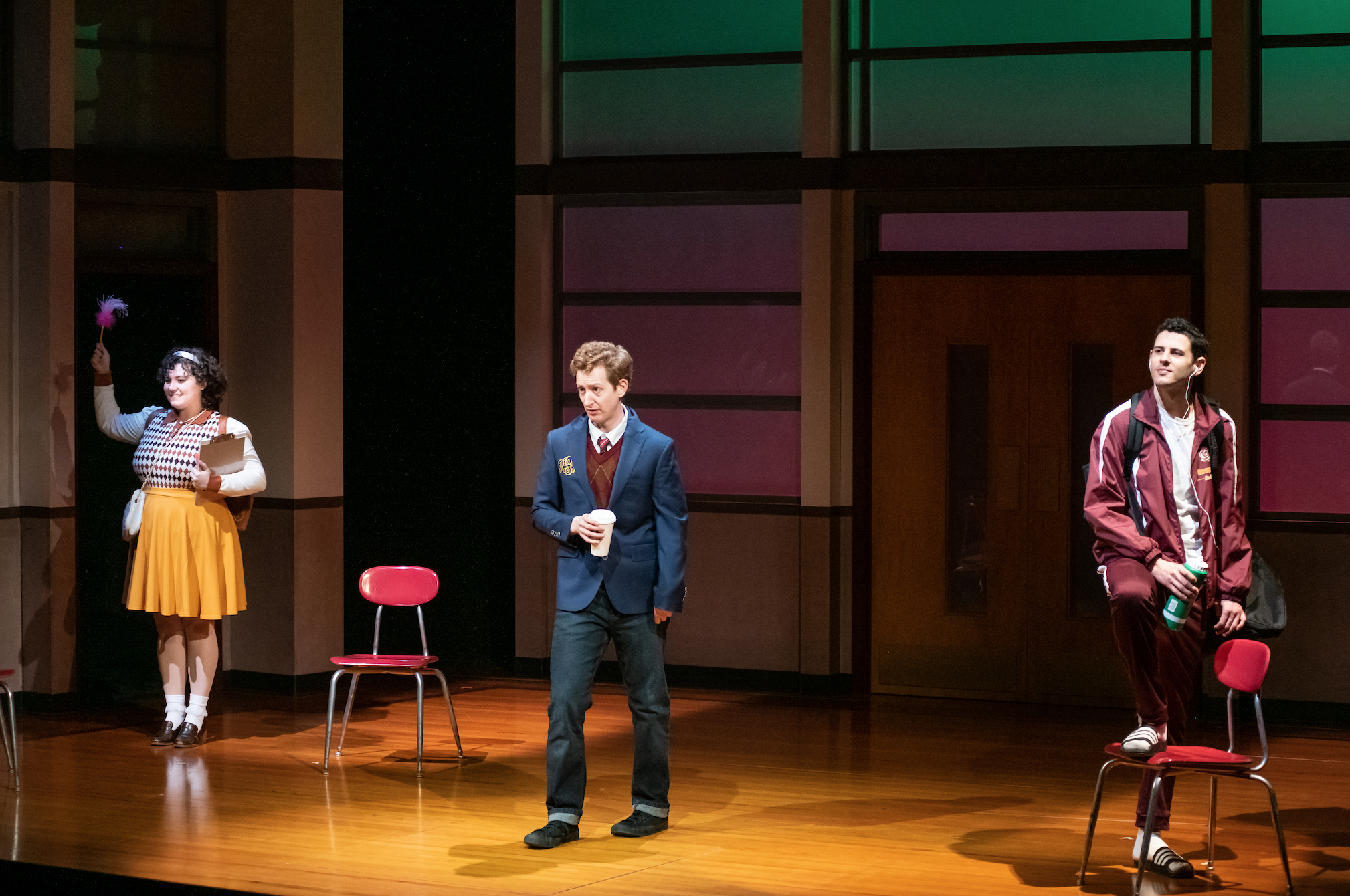Fall in Love With a Show Where Being Feared is the Only Option
Review of Teenage Dick presented by Seattle Repertory Theatre
Written by Teen Writer Adrian Martin and edited by Teen Editor Valentine Wulf

Immediately after the lights went down on Teenage Dick, there was complete and utter silence in the theater—silence that carried through the lobby and out the doors. Seattle Repertory Theatre has managed to make Richard III, one of Shakespeare’s many boring histories, worthy of stunned silence.
Shakespeare’s original tragedy features King Richard, a hunchback, who is determined to ascend to the throne by any murderous means necessary. He succeeds, but it comes at the cost of his allies, sanity, popularity, and his young wife Anne.
In this adaption, the characters' concern with popularity and political status is modernized in the setting of a 2010s American ASB election. Richard is reimagined as an awkward, and slightly maniacal high schooler with cerebral palsy, described as a “disabled nerd Icarus” by his friend Buck. He uses his perception as a helpless victim and underdog to secure allies and manipulate those around him.
Straying from typical adaptations of Richard III, Richard’s villainy is not linked to his disability in the standard way. Director Malika Oyetimein flips the traditional narrative by making Richard’s villainy an internalized reflection of his treatment. His atrocities are motivated by his self hatred, as well as his belief that he cannot be loved—only feared and infantilized. The choice between being loved or feared isn’t an option for him, leaving him to ask the audience: “What choice do I have but to be the villain?”
Richard is contrasted with Buck, a wheelchair user and the only other disabled character. Buck saves the show from casting disability in a villainous light, as she is neutral and content with her station, preaching that “no one owes anyone shit”. As comedic relief and Richard’s initial ally, Buck presents the other option, to not internalize the abuse but rather rise above it.

Richard, however, is unable to rise above, as seen when he lashes out at Buck when she condemns his violent actions, calling her everything he had been called by his bully and rival Eddie. In the final scene, the murder in the original play is replaced by an attempted murder resulting in Eddie becoming disabled himself, which Richard sees as a fate equivalent to death.
The disability advocacy in the production of Teenage Dick is not performative. Oyetimein herself is disabled and MacGregor Arney (Richard) and Meredith Aleigha Wells (Buck) have the same disabilities as their characters. With trigger warnings available, as well as sensory-friendly and subtitled performances Seattle Repertory Theatre does their part in making the show accessible.
There is careful attention to detail in the stunning accuracy in sets and dialogue. Playwright Mike Lew made a conscious choice to set this adaptation in the 2010s, which avoids the common pitfall of shows about teenagers trying to accurately portray the elusive and ever changing youth culture. Focusing more on the ways that these characters were teenagers rather than trying to jam in soon-to-be-dated cultural references, makes the experience much more timeless. The dialogue begins with a mix of classic, campy teen movie dialogue mixed with the original text and ends with all color lost in the grim and tragic ending. Teenage Dick slips from teen movie to Shakespearean tragedy so subtly, that the audience, much like the characters, don’t realize it until it’s too late. As Richard’s world view divides into black and white, the costuming does as well, until the only color is his blood covered hands and the dark red lighting.

The ultimate question Teenage Dick poses is whether it is better to be loved or feared. This is an adaptation that works perfectly in a modern setting. Teenagers often feel deep self hatred, worsened when you’re part of a minority group, where society is constantly reaffirming that hatred as a fact. All of this is made more intense when amplified by social media. Richard’s decision in the show to take the position as president at the cost of Anne’s life was not an exclusively villainous act, but the result of the idea that he could never be truly loved. The true villain of Teenage Dick is the consistent abusive treatment of disabled people. Richard, an insecure teenager, has completely internalized the way he is viewed and treated, and that is the tragedy.
Teenage Dick is brilliant, hilarious, and heart-wrenching. In its complicated portrayal of teenage antiheroism, it succeeds in what so many other shows about teenagers and disability fail to do—portray disabled teenagers in a way that is nuanced, complicated and not condescending. This is not only a fresh and interesting take on Shakespeare, but also a meaningful and moving story. By subverting tropes about disability, morality, and villainy, Teenage Dick takes another look at what it means to start the show as a hero and end the show with blood on your hands.
Lead Photo: MacGregor Arney and Meredith Aleigha Wells in Teenage Dick at Seattle Repertory Theatre. Photo by Nate Watters.
The TeenTix Newsroom is a group of teen writers led by the Teen Editorial Staff. For each review, Newsroom writers work individually with a teen editor to polish their writing for publication. The Teen Editorial Staff is made up of 6 teens who curate the review portion of the TeenTix blog. More information about the Teen Editorial Staff can be found HERE.
The TeenTix Press Corps promotes critical thinking, communication, and information literacy through criticism and journalism practice for teens. For more information about the Press Corps program see HERE.


